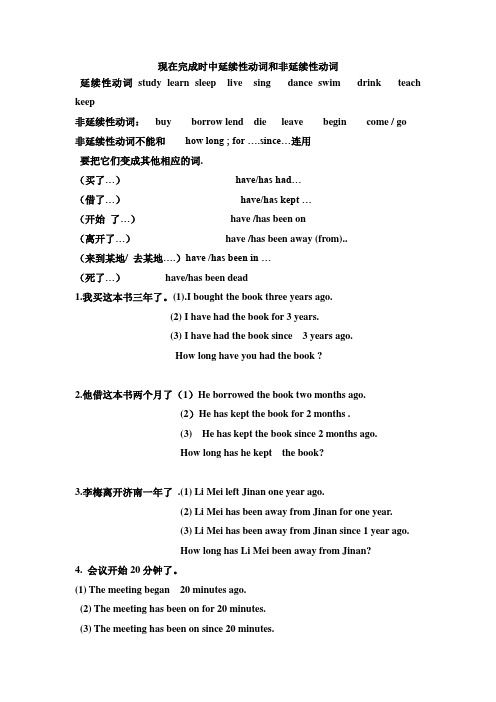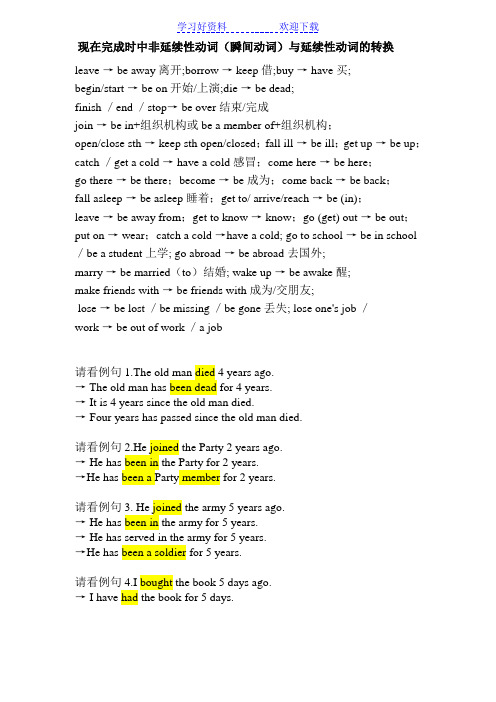现在完成时中延续性动词和非延续性动词
现在完成时延续性动词与非延续(瞬间性)动词

• It began to rain at eight yesterday morning .(正)又如:
• -When did you get to know Jack?
• -Two years ago.
•Then you've known each other for more th an two years.
• 一、延续性动词可以与表示时间段的状语连用。 表示时间段的短语有:
• for+一段时间,如:for 2 years,for a long time; since从句, 如:since he came here;
• since+时间点名词, 如:since last year, since 5 days ago; how long等。
• 2.延续性动词不能与表示短暂时间的"点时 间"状语连用。如: It raind at eight yesterday morning.(误 ) rain为延续性动词,而at eight表示"点时间 ",前后显然矛盾。如果用延续性动词表示 一瞬间的动作,可以借助come, begin, get 等终止性动词来表示。上句可改为
• 如:for 3 years,since he came here,how long,ect.且看下面三个错误句子:
• 1)Jim has come here for five years.
• 2)He has died for 3 years.
• 否定的终止性动词可以与表示时间段的时间状 语连用。
eg. I bought the book 5 days ago. I have had the book for 5 days.
延续性与非延续性动词在现在完成时态中的使用

延续性与非延续性动词在现在完成时态中的使用
延续性动词和非延续性动词在现在完成时态中的使用有一些区别。
1.延续性动词:
延续性动词表示持续的动作或状态,常见的有live(住)、work
(工作)、study(学习)、wait(等待)等。
在现在完成时态中,延续
性动词通常用来表示一个动作或状态开始于过去,持续到现在,并且可能
会继续下去。
例如:
- I have lived in this city for 10 years.(我在这个城市住了
10年了。
)
2.非延续性动词:
非延续性动词表示瞬间动作或不可数的状态,常见的有arrive(到达)、die(死亡)、finish(完成)、know(知道)等。
在现在完成时
态中,非延续性动词通常用来表示一个动作已经完成或一个状态已经发生,没有持续的时间。
例如:
- She has arrived at the airport.(她已经到达了机场。
)
- The project has finished.(项目已经完成了。
)
- I have known him since childhood.(我从小就认识他了。
)
需要注意的是,有些动词既可以是延续性动词,也可以是非延续性动词,根据上下文来决定其使用方式。
比如,动词sleep(睡觉)可以是延
续性动词,表示持续的睡眠状态,也可以是非延续性动词,表示一次性的睡眠动作。
延续性动词与非延续性动词在现在完成时中的运用

表示动作对现在的影响或结果
总结词
非延续性动词的现在完成时可以用来描述某个动作对现在的影响或结果。
详细描述
通过使用非延续性动词的现在完成时,可以强调某个动作所导致的当前状态或结果。例如,“She has left her keys at home”(她把钥匙忘在家里了)。
表示动作发生的频率或习惯性行为
museum once."中,"visited"是一个非延续性动词,强调参观博物馆这个动作只发生 了一次。
05
常见错误及注意事项
混淆延续性动词与非延续性动词的用法要点一总结词要点二
详细描述
在现在完成时中,动词的时态需要根据动作发生的时间和 持续时间进行判断,延续性动词和非延续性动词的使用有 不同的规则。
特点
动作或状态在一段时间内不断进行或持续,强调动作的持续性。
例句
I have lived in this city for 10 years. (我住在这个城市已经10年 了。)
非延续性动词
定义
非延续性动词表示的是一个动作的瞬间完成 ,不能持续,如“arrive”、“die”、 “finish”等。
使用延续性动词的现在完成时可以表示某个动作或状态从过去 某个时间点开始一直持续到现在,强调动作或状态的持续性。
详细描述
例如,“He has been working as a doctor for the past ten years.” (他过去十年一直在当医生。)这 句话表示“当医生”这个动作从十 年前开始一直持续到现在。
忽略时间状语对动词时态的影响
总结词
时间状语在句子中起到限定动作发生时间的 作用,对于判断动词时态非常重要。
现在完成时中延续性动词和非延续性动词

现在完成时中延续性动词和非延续性动词延续性动词study learn sleep live sing dance swim drink teach keep非延续性动词:buy borrow lend die leave begin come / go非延续性动词不能和how long ; for ….since…连用要把它们变成其他相应的词.(买了…)have/has had…(借了…)have/has kept …(开始了…)have /has been on(离开了…)have /has been away (from)..(来到某地/ 去某地….)have /has been in …(死了…)have/has been dead1.我买这本书三年了。
(1).I bought the book three years ago.(2) I have had the book for 3 years.(3) I have had the book since 3 years ago.How long have you had the book ?2.他借这本书两个月了(1)He borrowed the book two months ago.(2)He has kept the book for 2 months .(3) He has kept the book since 2 months ago.How long has he kept the book?3.李梅离开济南一年了.(1) Li Mei left Jinan one year ago.(2) Li Mei has been away from Jinan for one year.(3) Li Mei has been away from Jinan since 1 year ago.How long has Li Mei been away from Jinan?4. 会议开始20分钟了。
延续性与非延续性动词在现在完成时态中的使用

延续性与非延续性动词在现在完成时态中的使用一发生就结束了,常见的有:come, go, arrive, reach, leave, begin, start, buy, join, die, borrow, get up, become,动作的结果还存在),但由于它们不能延续,因此不能跟表示一段的时间状语连用。
(也即现在完成时的第二个基本用法中不能使用非延续性动词)。
e.g. Jim has come back. (正) 吉姆已经回来了。
Jim has come back for a month. (误) come back的动作不能延续一个月,因此错误。
(2)瞬间动词不可以用于有段时间的现在完成时态中,因此,若要解决这一问题,就应把它改为相应的延续性动词或短语,主要有以下几种:①用相应的延续性动词如:buy → have borrow → keep come/go/become → be put on → wear catch a cold → have a cold ②转换成如:join → be a member of go to school → be a如:die → be dead leave → be away begin → be on finish → be over fall asleep — be asleep open → be语如:come to/go to/arrive in (at)/get to/reach …→be in/at… join the army → be in the army(军队)e.g. I have borrowed the book. 我已经借了那本书。
I have kept the book for two days. 我已经借那本书两天了。
Jim has joined the band. 吉姆已经加入那乐队了。
Jim has been a member of the band for a month. 吉姆已经加入那个乐队一个月了。
现在完成时中非延续性动词(瞬间动词)与延续性动词的转换

现在完成时中非延续性动词(瞬间动词)与延续性动词的转换leave → be away离开;borrow → keep借;buy → have买;begin/start → be on开始/上演;die → be dead;finish /end /stop→ be over结束/完成join → be in+组织机构或be a member of+组织机构;open/close sth → keep sth open/closed;fall ill → be ill;get up → be up;catch /get a cold → have a cold感冒;come here → be here;go there → be there;become → be成为;come back → be back;fall asleep → be asleep睡着;get to/ arrive/reach → be (in);leave → be away from;get to know → know;go (get) out → be out;put on → wear;catch a cold →have a cold; go to school → be in school /be a student上学; go abroad → be abroad去国外;marry → be married(to)结婚; wake up → be awake 醒;make friends with → be friends with成为/交朋友;lose → be lost /be missing /be gone 丢失; lose one's job /work → be out of work /a job请看例句1.The old man died 4 years ago.→ The old man has been dead for 4 years.→ It is 4 years since the old man died.→ Four years has passed since the old man died.请看例句2.He joined the Party 2 years ago.→ He has been in the Party for 2 years.→He has been a Party member for 2 years.请看例句3. He joined the army 5 years ago.→ He has been in the army for 5 years.→ He has served in the army for 5 years.→He has been a soldier for 5 years.请看例句4.I bought the book 5 days ago.→ I have had the book for 5 days.。
现在完成时的延续性动词与非延续性动词
现在完成时的延续性动词与非延续性动词动词可分为延续性动词和非延续性动词(也称短暂性或瞬间动词),取决于动作发生的方式和过程的长短。
延续性动词可以与表示时间段的状语连用,如“for”加一段时间,比如“for2 years”,或者“since”加从句或过去时间点,比如“since he came here”或“since last year”、“since 5 days ago”。
非延续性动词表示不能延续的动作,一旦发生就立即结束。
在现在完成时的肯定句中,短暂性动词不能与表示时间段的“for”短语、since短语或从句连用,也不能与表示时间段的how long引起的疑问句连用。
例如,不能说“I have bought the book for 2 weeks”,而应该说“I have bought the book”,或者“I have had the book for two weeks”。
同样地,不能说“I have bought the book since twowee ks ago”或“I have bought the book two weeks ago”。
对于非延续性动词,可以使用其他方式表达。
比如,“The old man died 4 years ago”可以改为“The old man has been deadfor 4 years”、“It is/has been 4 years since the old man died”或“Four years has passed since the old man died”。
有时候,可以将短暂性动词转换为延续性动词。
例如,“go(to)/come(to)/XXX”可以改为“XXX”,“return/go back/come back”可以改为“be back”。
举个例子,可以说“XXX minutes ago”或“He has been in Beijing for ten minutes”;“My sister XXX”可以改为“My sister has been an engineer since 2005”。
延续性动词与非延续性动词及其转换_现在完成时必备
延续性动词与非延续性动词及其转换。
动词按其动作发生的方式、发生过程的长短可分为延续性动词与非延续性动词。
一.延续性动词表示能够延续的动作,如:learn, work, stand, lie, know, walk, keep, have, wait, watch, sing, read, sleep, live, stay等。
延续性动词可以与表示时间段的状语连用。
表示时间段的短语有:1, for+一段时间,for 2 years; 2, since从句,since he came here; 3,since+时间点名词, since last year, since 5 days ago;how long; for a long time等。
二.非延续性动词也称终止性动词、瞬间动词,表示不能延续的动作,这种动作发生后立即结束。
如:open, die, close, begin, finish, come, go, move, borrow, lend, buy等。
非延续性动词在肯定句中与表示时间点的状语连用,如:two years ago; at 5 o'clock;否定的终止性动词可以与表示时间段的时间状语连用。
3.延续性动词与非延续性动词之间的转换:leave --- be away, borrow --- keep, buy --- have, begin/start --- be on, die --- be dead, finish --- be over, join --- be in+组织机构, be a member of+组织机构, open sth --- keep sth open, fall ill --- be ill, get up---be up, catch a cold --- have a cold, come here --- be here, go there --- be there, become --- be, come back --- be back, fall asleep --- be asleep, get to/ arrive/reach --- be (in), leave --- be away from, get to know --- know, go (get) out →be out,put on→ wear;catch a cold →have a cold等。
延续性和非延续性动词(English)
非延续性动词可转换为相应的延续性动词: 非延续性动词 延续性动词 die 死 be dead come 来 be here go/leave 去/离开 be away (from) borrow 借 keep buy 买 have begin, start开始 be on finish 结束 be over marry 结婚 be married join the army参军 be in the army get angry 发怒 be angry catch a cold得感冒 have a cold catch fire 着火 be on fire
7. John and Mary _____ a year ago. A. married B. has married C. has been married D. had married 8. Miss Gao ____ this school since 1998. A. has come to B. came to C. has been in D. came to 9. I _____ a teacher for 23 years. A. have been B. have become C. was D. had been 10. How long ____ Mr Smith ____ ? A. did, die B. was, dead C. was, dying D. has, been dead 10. Jack ___ to the library. He ___ an hour ago. A. has gone, has left B. has gone, has been away C. has gone, left D. has been, has gone 11. – How long ___ you ___ ill ? -- Two weeks by now. A. did, fall B. have, fallen C. were, / D. have, been 12.I’ll lend you the bike, but you can only __it for two days. A. borrow B. lend C. keep D. take
现在完成时之延续性动词与非延续动词
延续性动词VS非延续动词
延续性动词:动词可以延续下去or产生持久影响
learn,work,stand,know,walk,keep,have,wait,watch,sing,read,sleep,live,stay
He has slept for more than 10 hours.
He has slept since last night/10 hours ago.
die
be dead
return
be back
begin/start
be on
open
be open
表2:
ห้องสมุดไป่ตู้非延续动词
延续性动词
borrow
keep
buy
have
catch a cold
have a cold
get to know
know
put on
wear
例:He hasleftbeen awayfor 3 days.
He has left.(√)
He has left for three days.(×)
How非延续动词延续性动词
表1:
非延续动词
延续性动词(be+...)
go to sp.
be in sp.
go to school
be a student
join
be a member of
leave
be away
3.改写句子
He went to Beijing two weeks ago.
He _____ ______ ______ Beijing for 2 weeks.
答案:1.C 2.D 3.has been in
- 1、下载文档前请自行甄别文档内容的完整性,平台不提供额外的编辑、内容补充、找答案等附加服务。
- 2、"仅部分预览"的文档,不可在线预览部分如存在完整性等问题,可反馈申请退款(可完整预览的文档不适用该条件!)。
- 3、如文档侵犯您的权益,请联系客服反馈,我们会尽快为您处理(人工客服工作时间:9:00-18:30)。
现在完成时中延续性动词和非延续性动词延续性动词study learn sleep live sing dance swim drink teach keep非延续性动词:buy borrow lend die leave begin come / go 非延续性动词不能和how long ; for ….since…连用要把它们变成其他相应的词.(买了…)have/has had…(借了…)have/has kept …(开始了…)have /has been on(离开了…)have /has been away (from)..(来到某地/ 去某地….)have /has been in …(死了…)have/has been dead1.我买这本书三年了。
(1).I bought the book three years ago.(2) I have had the book for 3 years.(3) I have had the book since 3 years ago.How long have you had the book2.他借这本书两个月了(1)He borrowed the book two months ago.(2)He has kept the book for 2 months .(3) He has kept the book since 2 months ago.How long has he kept the book3.李梅离开济南一年了.(1) Li Mei left Jinan one year ago.(2) Li Mei has been away from Jinan for one year.(3) Li Mei has been away from Jinan since 1 year ago.How long has Li Mei been away from Jinan4. 会议开始20分钟了。
(1) The meeting began 20 minutes ago.(2) The meeting has been on for 20 minutes.(3) The meeting has been on since 20 minutes.How long has the meeting been on5. Tom来中国10个月了。
(1)Tom came to China 10 months ago.(2 ) Tom has been in China for 10 months.(3 ) Tom has been in China since 10 months ago.How long has Tom been in China6.Marry的祖父去世三年了。
(1)Marry’s grandfather died 3 years ago.(2) Marry’s grandfather has been dead for 3 years.(3) Marry’s grandfather has been dead since 3 years ago.How long has Marry’s grandfather been dead练习1.Tom ___for several hours.A. went to bedB. has been in bedC. has gone to bedD. has beento bedlong have you____this cityA. been toB. been inC. come toD. gone to3. My aunt ____the TV for 4 months. A. has boughtB. was boughtC. was hadD. has had4. Mr Brown ____the car for 3 months.A. boughtB. had boughtC. has hadD. buys5. The old man ___for two days. A. has diedB. has been deadC. diedsister has____ for 8 years. A. become a driverB. left the cityC. arrived in the cityD. lived herelong have you___A. joined the teamB. become a team leaderC. been in the teamD. left the team8. You are late. The film ____for 10 minutes.A. has begunB. has been onC. has finishedD. has started9. How long has she _____the newspaperA. borrowB. lendC. keptD. buy初三上学期期中最可能的考点1.他已经离开济南3天了. He _____ _____ ______ ______Jinan for 3 days. 2.请取下这张图片,我不需要它了。
Please_____ _____the picture. I don’t need it.3.鲁迅写的这本书很有趣。
The book_____ _____ ______by Lu Xun is very interesting.=The book_______ by Lu Xun is very interesting. 4.他说在公共场所分发广告是不对的。
He said_____ _____advertisements ______not right.5.穿越丛林是危险的。
_____ _____ the______ ______dangerous.6.姚明坚持每天打篮球。
Yao Ming _____ _____ ______ ______basketball every day.7.你介意不玩电脑游戏吗Would you ______ _____ _____ ______ computer games8.他在与同学们相处方面有困难。
He_____ ______ _____ _____ _____his classmates.9.新修的路使人们的出行更加方便。
The new road_____ _______ ______for people to go out.10.好天气使我们上周末的野餐非常完美。
The good weather _____ _____ _____ for us to have the picnic last weekend. 12.他参加了上周的一次英语演讲比赛。
He _____ _____ _____an English speech contest last week.13. I made the boy do his homework.(改为被动语态)The boy_____ _____ _____do his homework.used to be a river near here.否定句:There _____ _____to be a river near here.一般疑问句:_____ ______ _____a river near here回答:Yes,____ ______. No, ______ ______.反义疑问句:There used to be a river near here,____ ______15. He didn’t go to the park yesterday because the weather was bad.(同义句)He didn’t go to the park yesterday _____ ______ the______ ______.16. The girl didn’t come to school yesterday because she was ill.= The girl didn’t come to school yesterday______ ______her ______.played basketball yesterday. We didn’t go swimming.= We played basketball yesterday______ ______ _______ ______.19. Even though my father was no longer with us, he was watching me and would always take pride in everything good I do.=My father______with us _____ ______, _____he was watching me and would_____ __________ everything good I do.如果引导条件状语从句,时态要求:主将从现We will go to the park if it doesn’t rain tomorrow.The boy will pass the exam if he works hard.if 如果引导虚拟条件状语从句,时态要求:主句过去将来,从句一般过去If I were you , I would study hard..He would buy a big house if he had a lot of money like Bill Gates.if 是否引导宾语从句从句的时态由具体的时间状语决定I don’t know if he_____ _____(come) tomorrow.I don’t know if he______(go)to the park yesterday.I don’t know if he____________ already_______ (finish) his homework.I don’t know if he_____ ________(succeed) in the coming exam.learns English by asking the teacher for help.(提问)_____ _____he_____ Englisham much too heavy because eat too much junk food and too many eggs. 23.这音乐使我想起了巴西的舞曲The music _____ ______ ______Brazilian dance music.really ______this ______boy.(love)_____in a ______city two years ago.(live)26感官动词look sound smell taste feel27. a number of = a lot of = lots of许多,大量There are a number of students in the room..the number of…… is ……的数量是The number of the students in our class is 43.28.感叹句:对名词发出感叹What+a/an+形容词+名词+主语+谓语+其他!单数可数名词:What a good teacher she is!What an honest boy he is!不可数名词:What clean water it is!What good weather it is!复数名词:What good students you are!对形容词或副词发出感叹:How+形容词、副词+主语+谓语+其他!How heavy the table is! How fast the boy runs!。
